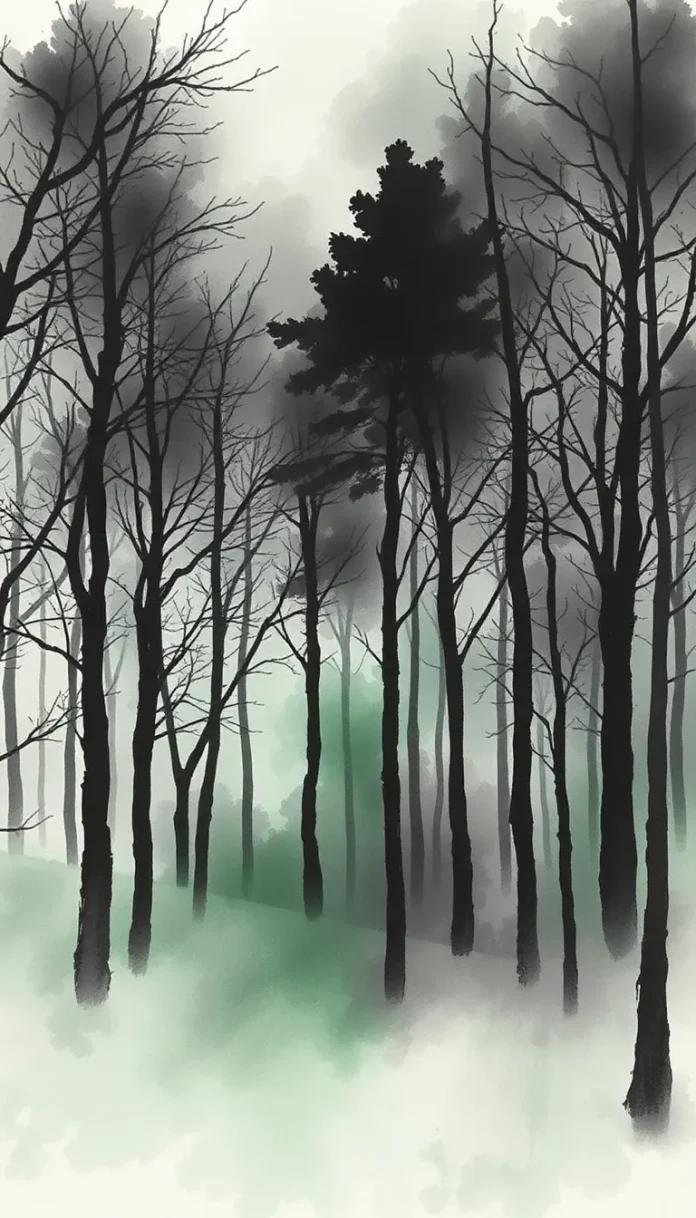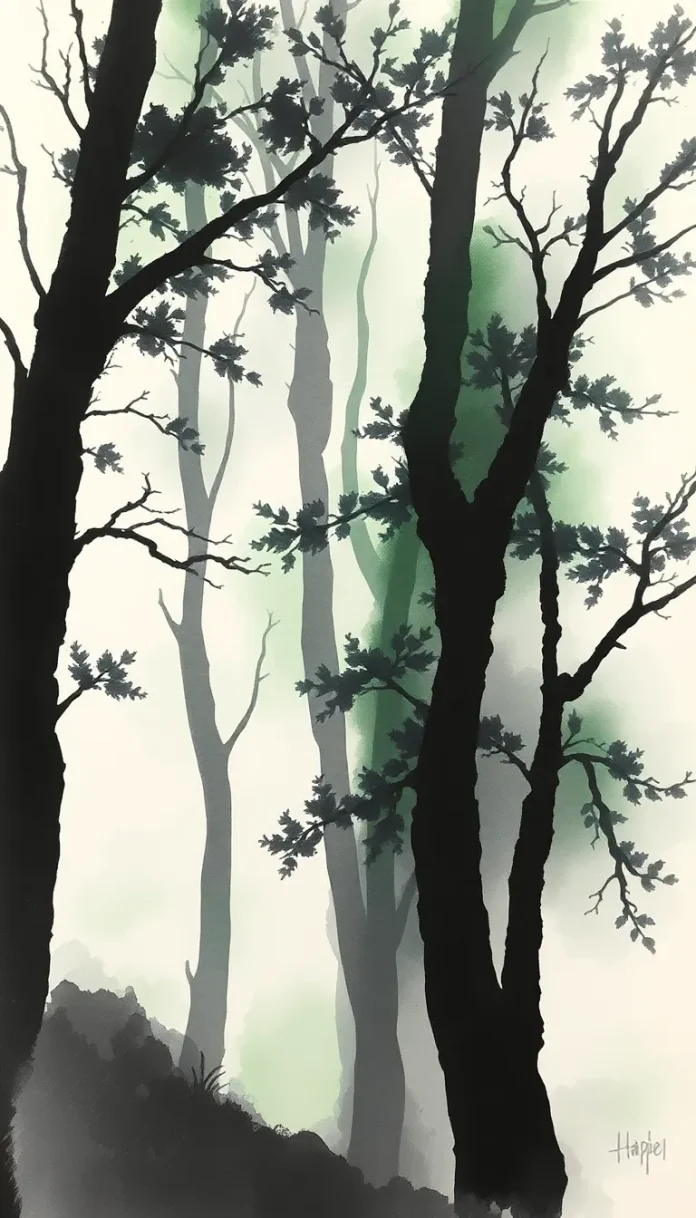Mourning in the Desolate Courtyard
Beneath the delicate patter of rain, the courtyard became a stage of melancholy, where every droplet whispered secrets of long-lost days. The very air seemed suffused with memories; echoes of laughter, murmurs of conversations once vibrant, and the rustle of garments that had brushed against fate’s cruel hand. Cindered ivy crept over fractured arches, mocking the grandeur of a past life now surrendered to decay. The courtyard was an allegory, a testament to time’s inexorable march and the weight of remorse.
Âme, a wanderer cloaked in grief, moved with an uncertain gait among the desolation. Each step resonated with the cadence of a heart burdened by the residue of former choices, choices that had rendered his spirit a tapestry of lamentation. His eyes, deep and reflective as a storm-darkened sea, beheld the spectral remnants of what might have been—a beloved smile, a promise half-spoken, a fleeting moment of incandescent joy now lost in the crypt of memory.
“How did I come to be so ensnared in this web of sorrow?” he murmured, his voice scarcely audible over the mournful whispers of the rain. The courtyard, a silent witness to his internal torment, seemed to absorb his lament like the damp earth beneath the splattering rain. With each droplet, the past was reborn: a flood of vivid recollections threatened to overwhelm him—a panorama of faded hopes, half-forgotten dreams, and the bittersweet recollections of love that had slipped away like grains of sand through trembling fingers.
In a secluded corner of the courtyard, a decayed marble fountain, its water long ceased to flow, bore the scars of time. The fountain, once the heart of the edifice, now served as a mirror to the soul—a mirror reflecting the inexorable truth that life, in its relentless progression, diminishes all things beloved. Âme paused beside the fountain, his hand reaching out as if to caress the cold stone, and in that moment, the rain sang its elegy, resonating with a secret language of grief.
“My choices,” he whispered as if confiding in the stone, “are like the water that once danced here—fleeting, irretrievable, and forever lost.” In his inner monologue, turbulent echoes of regret mingled with the soft, melancholic music of the rain, composing a requiem for a self his heart no longer recognized. With each syllable, his mind revisited labyrinthine pathways of the past—moments when the scales of fate had tipped inexorably toward despair, when a tender hand had recoiled in the face of uncertain destiny.
He recalled images of yesteryear: delicate figures bathed in the glow of lamplight, laughter echoing in halls draped in twilight’s gentle embrace, and farewells spoken beneath the pall of inevitable sorrow. But in this courtyard, all that remained were spectral shadows: a flirtation with hope, the fervor of youthful abandon, and the eventual descent into a malaise wrought by time and the unyielding cruelty of consequence. Each memory was a needle, stitching wounds anew upon the delicate fabric of his soul—a fabric that now bore the colorful embroidery of remorse and the dark hues of lonely nights.
The rain intensified, as if encouraging the lament to swell beyond moderation, to seize the heart in a furious, yet tender grip. The sound of droplets provided an unremitting chorus to a ballad of regret—a harmonious paean to ephemeral lives and the inevitability of aging. Roots of wild ferns, void of life, crept under the worn stone edges, reminding him how nature, too, succumbed under the weight of neglect and abandonment.
“Can one ever redeem the choices that have wrought such endless sorrow?” he questioned aloud, his voice embracing the solitude of the silent courtyard. The answer, it seemed, lay hidden in the veiled depths of his own being—a secret locked away behind cobwebbed corridors of memory. His inner dialogue, replete with philosophical inquiries and introspective soliloquy, asked again and again in vain for absolution from the tyranny of remorse. He, like the courtyard, was a relic of a proud past, now humbled by the inexorable march of fate.
The faint echo of a distant voice, soft and mournful, drifted amid the patter of rain—a spectral conversation of echoes. “Once, hope resided in these ancient stones, and dreams flourished like blossoms in spring,” said a muted tone, carried by the wind. It was as if the ghosts of those lost days—phantom remnants of another time—had come to engage with him. Yet, their words were not consoling; they were a mirror to his inner desolation, a reflection of what once was and what could never be again.
In the midst of his solitary wanderings, Âme encountered a weathered bench, half-swallowed by ivy and the relentless passage of years. Here, he allowed himself a moment of respite, settling into the cold, unyielding embrace of the stone. His thoughts, heavy as lead, meandered along the paths of regret. “I have cast aside opportunities like autumn leaves blown by an indifferent wind, and in doing so, I have forsaken the beauty of life itself.” His inner soliloquy repeated these lamentations, layering the sorrow with the patina of resignation.
A soft murmur escaped him—a dialogue with a memory, quiet and laden with melancholy. “I once believed that in the dance of life, every step was a promise of tomorrow. Yet here I stand, in the twilight of my existence, before this forsaken courtyard, helplessly ensnared by the choices that have led me astray.” The interplay of spoken confession and internal rumination wove a tapestry of despair that was as intricate as the lace of raindrops upon the ancient stones.
Yet amidst this ongoing introspection, a faint wistfulness surfaced—a longing for a redemption that intermingled with a profound recognition of the human condition. For was man not a wanderer in this vast, indifferent world, his soul forever tethered to the duality of hope and despair? Even as the rain washed away the patina of years, it could not expunge the indelible marks of error and longing. In that melancholy interplay of light and shadow, he discovered a truth as simple and as brutal as the constant drip of rain: life was but a series of transient moments, punctuated by both joy and regret, destined to fade into the annals of memory.
The ambiance of the courtyard deepened with each passing moment. The fine rain, now a subtle, unrelenting mist, imbued the surroundings with an even greater sense of isolation. A gentle gust stirred the brittle leaves, sending them tumbling in a solitary dance—an allegory for his own restless spirit. The city beyond, once vibrant and vivid, now lay cloaked in an ephemeral gloom. And within the heart of this abandoned sanctum, Âme’s reflection in the moisture-laden cobbles seemed to frown back with an echo of disdain at his own transgressions.
As night’s chill began to descend, the courtyard metamorphosed into a realm where time and regret entwined in a lattice of sorrow. Each droplet of rain was a morsel of memory, a fragment of the choices that had distanced him from a once radiant path. The somber symphony of raindrops and his own subdued murmurs created a sacred cadence—a hymn to a vanity that was at once beguiling and utterly desolate. It was a lamentation for the dreams that had disintegrated beneath the relentless assault of fate, a dirge for the splendors that had been usurped by an unavoidable melancholy.
“I must bear this weight of remorse,” he whispered, his tone reflective and resigned. “For every choice, every faltering step, has led me to the precipice of a sorrow too profound to be dismissed.” His inner dialogue was laden with an acceptance of the inevitability of regret—a slow, painful surrender to the immutable truths of a transient existence. With each passing moment, the realization crystallized that his life, much like the forsaken courtyard, was an edifice of memories: resplendent in its antiquity yet condemned to crumble under the weight of forgotten glory.
There, under the tender caress of a rain that seared his very soul, he recalled the faces of those he had loved and lost, the fleeting smiles and hopeful glances that had once bestowed life with a celestial glow. The echo of their voices—now as soft as the sighing wind—spoke of promises unkept, of a bygone era where the vibrancy of emotion had painted the world in hues of passion and wonder. No longer did these recollections evoke joy; rather, they stoked the embers of remorse, transforming joy into a shadow of its self—a fleet figure in the unrelenting drama of life and regret.
In one final act of introspection, as the night crept stealthily upon the deserted courtyard, Âme rose from the worn bench, his resolve mixing with his pervasive despair. With a measured pace borne out of habits cultivated by regret and sorrow, he walked past the relics of forgotten time—a rusted gate, a shattered window, a once-glorious arch now consumed by the tenebrous mists of neglect. Everywhere his weary eyes turned, there lay a relic of an era cherished yet irrevocably lost. And with every step, his inner monologue rehearsed a mournful dirge: “I walk the corridor of my own making, burdened with the choices that have marred the canvas of my life.”
Nature, in its indifferent splendor, continued to cascade its tears upon him. The rain, an eternal witness to his anguish, lent an unspoken testimony to the ephemeral nature of existence. It spoke of the juxtaposition between what was and what might have been, a vivid yet heartbreaking saga of every step taken, every opportunity spurned. The night, cloaked in shadows that mirrored the labyrinth of his internal struggles, became a tapestry where each thread was an emblem of hedonistic regret and a resigned acceptance of the human plight.
In the solitude of this forsaken labyrinth—a once hallowed ground now repurposed as a mausoleum to forgotten dreams—Âme’s final, trembling words mingled with the pitter-patter of rain and the whispered elegies of the past. “I have walked a path paved with the residues of my own errors, and now, here in this ruin of my own heart, I stand bereft of hope. My choices, like the droplets cascading ceaselessly upon this parched stone, are innumerable and indelible.” His confession was both a lament and an admission—a quiet acknowledgment that the allure of life had been dimmed by the inescapable specter of regret.
At long last, as the horizon absorbed the last vestiges of feeble light, the courtyard seemed to exhale a collective sigh—a final tribute to the weight of lost time and irrevocable sorrow. The rain, soft and relentless, persisted in its melancholic cadence, each droplet narrating the hopeless chronicle of a life beset by errant decisions. In that final, heart-wrenching moment, Âme realized with crushing clarity that his soul—haunted by the ghosts of its own misguided choices—was destined to remain adrift forever, an echo in the hollow corridors of memory.
Thus, amidst the bitter symphony of drizzling rain and the silent testimony of decaying stone, Âme wandered into the night—a solitary figure diminished by regret. His journey, halted at the threshold of an unfathomable sorrow, was a sorrowful reminder of the tragic beauty inherent in the human condition: that every heart, no matter how fervent its yearning, may one day find itself marooned in the desolate landscape of its own despair. And so, with each step that melted into the shadowy embrace of evening, his forlorn spirit faded into the pallid gloom, leaving behind nothing but the mournful murmur of a life condemned to regret.
In the end, the deserted courtyard remained—a silent monument to the impermanence of dreams and the eternal whisper of regret, a testimony to the haunting truth that some souls are fated to forever circle the ruins of what might have been, their lament an endless refrain in the melancholy aria of mankind.


